Ertach Kernow - Cornish hero 'An Gof' a name perpetual
The memory of Michael An Gof may now some 500 years after his death be considered a name for rallying Cornish folk behind. The Tudor dynasty certainly had serious repercussions on Cornwall, its actions were a primary influence on the almost extinction of the Cornish language centuries later. The events of 1497 were unrelated to the later 16th century Cornish uprising, and were brought about through tax raising by Henry VII to fund his war with Scotland. Cornishmen felt that the cost of issues with Scotland should be met by those in the North and along the border, not by those in Cornwall and the south of England.
Henry’s grasp on the throne of England was not firm despite his victory at Bosworth against Richard III, and threats through a royal pretender (claiming to be Richard, one of the Princes in the tower) Perkin Warbeck remained. Warbeck arrived in Scotland in 1495 and integrated himself with James IV, leading to a Scottish invasion of England in 1496. Henry raised an army under the Earl of Surrey and the Scottish threat was eliminated. James withdrew support for Warbeck who left Scotland and travelled to Ireland for a time.
Michael Joseph a blacksmith living in St Keverne appears to have been a strong-minded fellow used to speaking his opinions publicly. Cornish discontent over the increases in taxation led to him being chosen to lead a march to London. On reaching Bodmin Thomas Flamank a lawyer, who was claiming the tax to be illegal, joined them and with a growing force of men marched through Devon attracting more followers, although fewer than they had hoped for. Continuing their march through Somerset they were joined by James Touchet, Baron Audley who was appointed their leader due to his military experience.
As they approached London Henry VII diverted some 8,000 men from his forces going to Scotland, sending a smaller defensive force to England’s northern border. London’s population had risen to defend the city and the Cornish forces and allies moved towards Kent hoping to gain support. However, this plan of Flamank’s backfired, with men from Kent being mobilised against them. Camping overnight at Blackheath there was much discontent amongst the dissident army. Many men had joined the rebel Cornish forces to give voice to the King and his advisers against the tax increases, not to fight treasonously in open revolt. Overnight in their thousands men abandoned their erstwhile Cornish comrades.
The battle of Battle of Blackheath met an inevitable end. Well trained government troops including cavalry routed the now depleted and badly equipped rebel forces, the leaders Audley, Flamank and Joseph were captured. On 27th June 1497 Michael Joseph, better known today as ‘An Gof’, and Thomas Flamank were executed at Tyburn in London. Sentenced to be hung, drawn whilst still alive, and quartered this was commuted by the king to just being hanged and quartered with their heads being displayed on London Bridge. An Gof is recorded as saying whilst being dragged to his death, that he should have "a name perpetual and a fame permanent and immortal". Audley due to his status was beheaded but his head later joined those of his comrades on London Bridge.
Later that year Warbeck would sail to Cornwall, landing at Whitesand Bay to encourage a second attempt at gaining the throne with promises of ‘tax breaks’. A number of Cornish gentlemen still smarting under the heavy yolk of taxation had joined Warbeck and a gathered force of some 6,000 gathered at Bodmin’s ancient hill fort of Castle Canyke, where Warbeck was declared ‘Richard IV’. An attack by the Sheriff of Cornwall failed with a large number of his men joining Warbeck’s Cornish forces. They then marched into Devon, attacking Exeter but were unable to take the city. Moving onward through Somerset to Taunton the Cornish forces were attacked by Henry’s army. By then Warbeck had already deserted and was later captured, after leaving the Cornish army, which also surrendered. The leaders were executed, and heavy fines being laid on Cornwall.
Warbeck although captured was well treated by Henry, although under guard, but repeated attempts to escape eventually led to him being hanged at Tyburn in 1499. Cornwall and the men who rose up were pardoned in 1508 subject to payment of large fines, but Henry reinstated authority to the Cornish Stannary Parliament.
Over the past 500 years the political landscape has changed dramatically. The formation of the United Kingdom saw the Celtic minority nations of mainland Britain brought within its fold, ruled by a London based English dominated parliament. However, Westminster appears to have learned little from history in maintaining good relationships with its Celtic fringe. Celtic nationalism is on the rise in both Cornwall and Wales exacerbated by lack of legislative support for these regions relating to housing and poverty. Is it coincidental that the Cornish language together with its close cousin the Brythonic Celtic Welsh language grow increasingly popular? The union of the United Kingdom has never been under so much pressure since its formation as it is today. Scotland is on the verge of being lost and even the SNP now realises it needs to have policies that address Scottish cultural issues such as support for its own Celtic Gaelic language.
Cornish revolts such as those of 500 years ago are now highly unlikely. However, calls for devolved powers grow ever stronger as discontent simmers increasingly hotter beneath the surface. The recent G7 hasn’t been seen by everyone as a positive event for Cornwall, but as an opportunity to protest against the many issues here. Cornish tourism industry is no longer seen in a totally positive light. Massive influx of English visitors, perhaps more used to sand, sea and sangria of the Costa’s, rather than Cornwall’s cultural heritage and environmental delights has already been overwhelming this year. As I write, news that Cornwall’s COVID rates are rising and with many hospitality venues closing along with calls, in some media outlets, to restrict people visiting Cornwall. Housing issues are rampant exacerbated by increase in second home ownership and investors letting for Airbnb income rather than permanent letting. This has led many local people unable to find somewhere to live. Ironically this has had a detrimental effect on the tourism industry with lack of accommodation for workers and too few staff available to work within the hospitality and heritage sectors. Reports of abuse to hospitality workers by visiting English tourists is rife.
Documentaries, such as the recently lauded BBC television documentary ‘Cornwall with Simon Reeve’, along with Cornish cultural sector performance art, including the recent highly acclaimed film ‘Behind the Postcard’, highlight many of Cornwall’s issues. The CEO of the Cornwall Museum Partnership recently raised the question; ‘Visit Cornwall boss suggests the arrival of Tate in St Ives was the catalyst for the second home boom. Does the cultural sector have a case to answer?’ This was in response to a newspaper article entitled ‘How acute inequality scars Cornish idyll hosting G7 summit’. There is interconnectivity between heritage, tourism and Cornish day-to-day life issues. Cornwall’s heritage is unique, we should consider ourselves very blessed that our Celtic language was saved from extinction with many organisations and voluntary groups working hard in cultural preservation. Cornwall’s heritage sector needs to demonstrate the attitude, policies and actions of government at both central and local level have serious repercussions on Cornwall’s culture and wider environment. To preserve the wellbeing and lives of many people living throughout Cornwall along with our wonderful landscapes, maritime coastline and environmental heritage a re-evaluation of priorities perhaps needs to take place.
Click the link to see the Screen Cornwall 'Behind the Postcard' webpage and video
Discontent today and calls for changes in policy and power take place not with a sword but with a stumpy pencil and people placing a cross in a box. Those now in power should remember their time is fleeting, time dependent on the will of the voters they serve.
Many throughout Cornwall will commemorate the uprising of 1497 on 27th June, the anniversary of the execution of ‘Michael An Gof’ and Thomas Flamank. There will be a 1497 commemoration held on Sunday 27th June at 11.00am with singing 'Trelawny' at the Flamank Plaque, Celtic Cross, Lower Bore Street, Bodmin. St Keverne will see a bilingual history walk around the village meeting in the Square at 3.00pm led by Loveday Jenkin. There is no need to book, just turn up. At 7.00pm at St Keverne’s commemorative statues there will be a procession with speeches and singing.
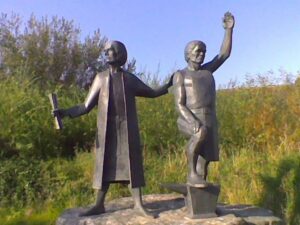
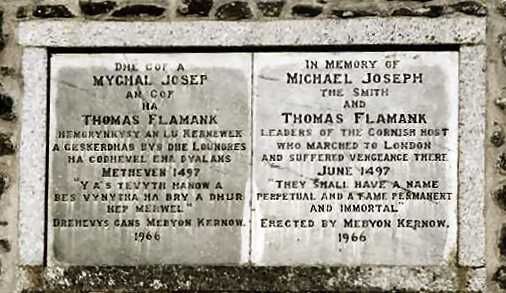
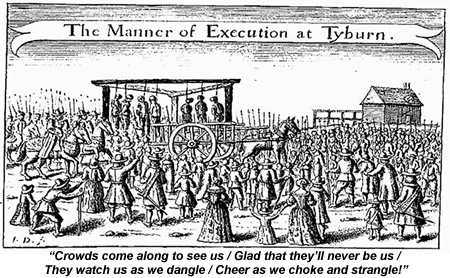
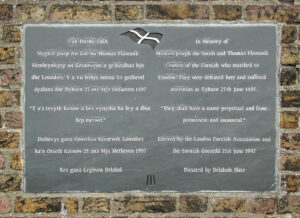
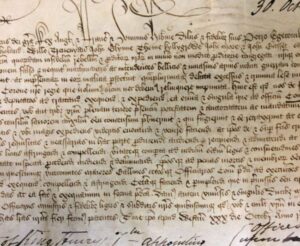
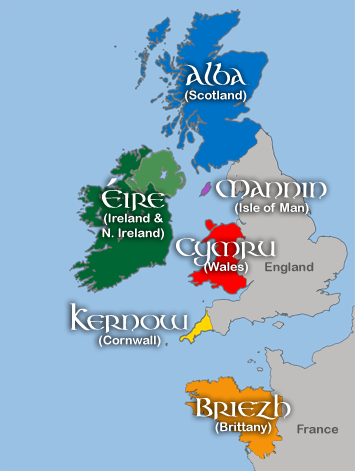
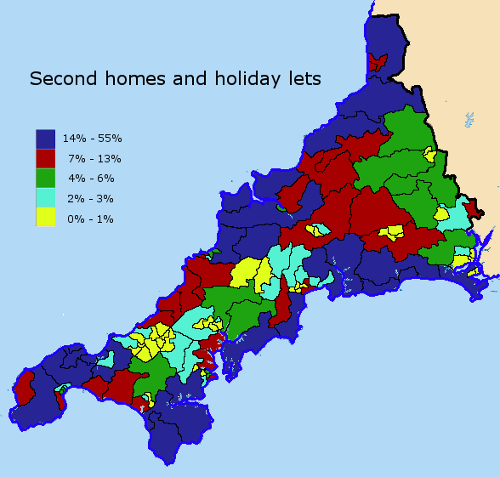
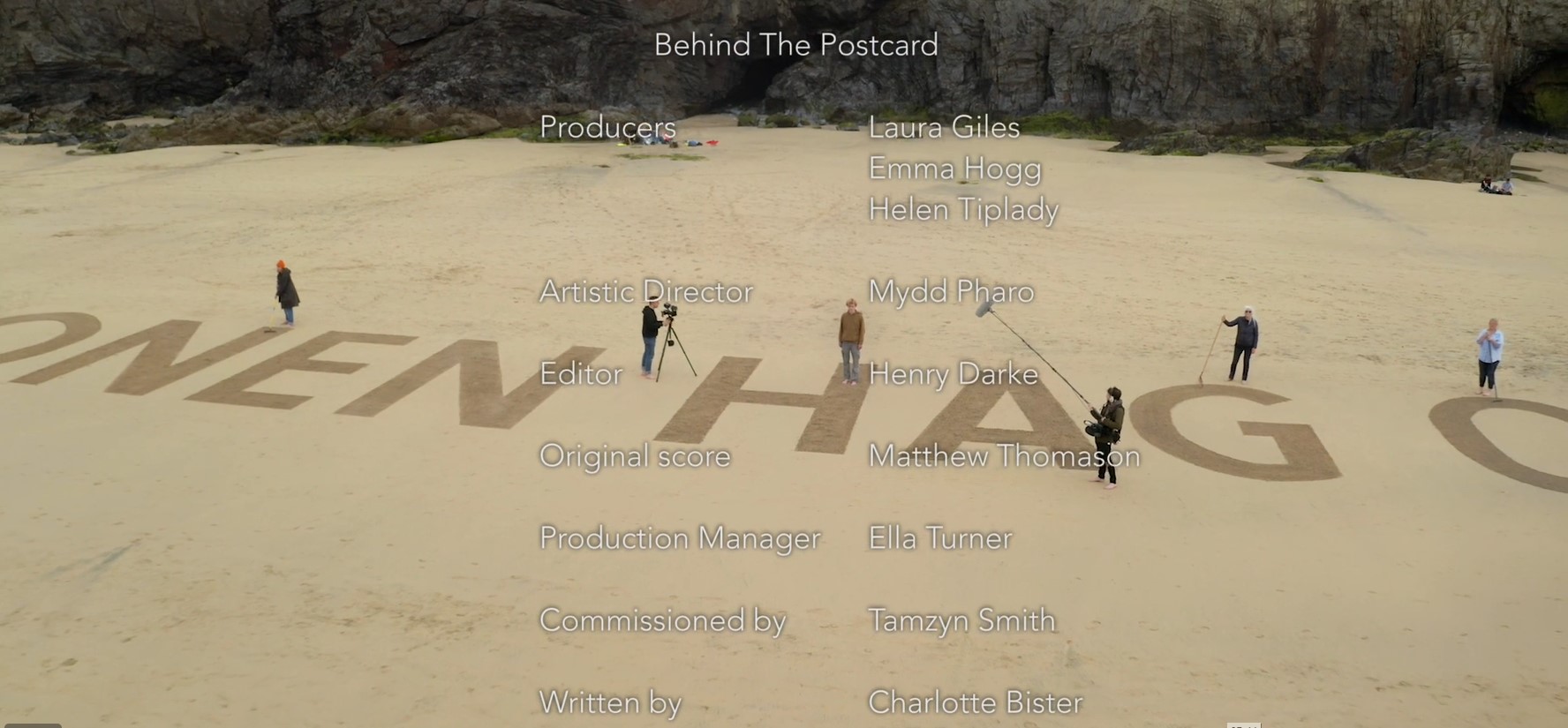
![[52] Voice - Ertach Kernow- 230621A A name perpetual [S] Ertach Kernow - A name perpetual](https://www.cornwallheritage.com/wp-content/uploads/2021/06/52-Voice-Ertach-Kernow-230621A-A-name-perpetual-S-233x300.jpg)
![[52] Voice - Ertach Kernow- 230621B A name perpetual [S] Ertach Kernow - A name perpetual](https://www.cornwallheritage.com/wp-content/uploads/2021/06/52-Voice-Ertach-Kernow-230621B-A-name-perpetual-S-230x300.jpg)